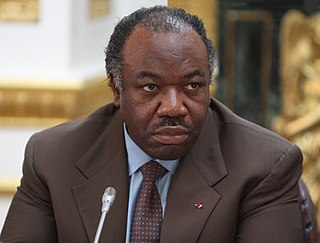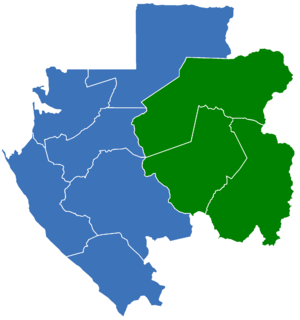Little is known of the history of Gabon prior to European contact. Bantu migrants settled the area beginning in the 14th century. Portuguese explorers and traders arrived in the area in the late 15th century. The coast subsequently became a center of the slave trade with Dutch, English, and French traders arriving in the 16th century. In 1839 and 1841, France established a protectorate over the coast.

El Hadj Omar Bongo Ondimba was a Gabonese dictator under French control who was President of Gabon for 42 years, from 1967 until his death in 2009. Omar Bongo was promoted to key positions as a young official under Gabon's first President Léon M'ba in the 1960s, before being elected Vice-President in his own right in 1966. In 1967, he succeeded M'ba to become the second Gabon President, upon the latter's death.

The Gabonese Democratic Party, is the ruling and dominant political party of Gabon. Between 1968 and 1990 it was the sole legal party.

The Gabon national football team, nicknamed Les Panthères or Les Brésiliens, is the national team of Gabon and is controlled by the Gabonese Football Federation. They have never qualified for the World Cup, but have qualified seven times for the Africa Cup of Nations.

Elections in Gabon take place within the framework of a presidential multi-party democracy with the Gabonese Democratic Party, in power since independence, as the dominant party. The President and National Assembly are directly elected, whilst the Senate is indirectly elected.

Ali Bongo Ondimba, sometimes known as Ali Bongo, is a Gabonese leader who has been President of Gabon since October 2009.

Presidential elections were held in Gabon on 27 November 2005. Incumbent President Omar Bongo, in power since 1967, sought another seven-year term against four other candidates. According to an announcement of results by the country's interior minister, the result was a victory for Bongo, who received 79.2% of the vote. Bongo was sworn in for another seven-year term on 19 January 2006.
Pierre Mamboundou was a Gabonese politician. He was President of the Union of the Gabonese People (UPG), an opposition party in Gabon, from 1989 to 2011.
Casimir Marie Ange Oyé-Mba is a Gabonese politician. After serving as Governor of the Bank of Central African States (BEAC) from 1978 to 1990, Oyé-Mba was Prime Minister of Gabon from 3 May 1990 to 2 November 1994. Subsequently he remained in the government as Minister of State for Foreign Affairs from 1994 to 1999, Minister of State for Planning from 1999 to 2007, and Minister of State for Mines and Oil from 2007 to 2009.

Parliamentary elections were held in Gabon on 17 December 2006, although voting in seven seats took places on 24 December 2006 due to logistical problems. The ruling Gabonese Democratic Party (PDG) won 82 seats, with other parties that supported President Omar Bongo winning another seventeen seats, among them the National Woodcutters' Rally of Paul M'ba Abessole with seven seats, the Democratic and Republican Alliance with three seats, the Circle of Reformist Liberals with two seats and the Social Democratic Party with one seat.

Vice President of Gabon is a political position in Gabon. It existed from 1961 to 1975 and from 1997 to 2009, and since 2017 the post has been held by Pierre Claver Maganga Moussavou.

Presidential elections were held in Gabon on 6 December 1998. Incumbent President Omar Bongo Ondimba, in power since 1967, sought a seven-year term against five other candidates. It was Gabon's second multi-party presidential election and, despite low turnout and polling problems, Bongo won the election with 66.88% of the vote.

Local elections were held in Gabon on April 27–30, 2008, with 1,990 municipal and departmental councillors being elected.
Jean-Boniface Assélé is a Gabonese politician and the President of the Circle of Liberal Reformers (CLR). He served in the government of Gabon from 1975 to 1990 and again from 2004 to 2009. He was also Commander-in-Chief of the National Police Forces from 1970 to 1989 and held the rank of General. Since September 2009, Assélé has been the Fourth Vice-President of the Senate of Gabon.

Rose Francine Rogombé was a Gabonese politician who was Acting President of Gabon from June 2009 to October 2009, following the death of long-time President Omar Bongo. She constitutionally succeeded Bongo due to her role as President of the Senate, a post to which she was elected in February 2009. She was a lawyer by profession and a member of the Gabonese Democratic Party (PDG). Rogombé was the first female head of state of Gabon. After her interim presidency, she returned to her post as President of the Senate.

Early presidential elections were held in Gabon on 30 August 2009. They took place due to the death of incumbent President Omar Bongo on 8 June, after more than 41 years as the sole president of Gabon. While the constitution stated that interim President Rose Francine Rogombé should organise elections within 30 to 45 days, the Constitutional Court accepted the government's request for a delay due to the circumstances.

Presidential elections were held in Gabon on 27 August 2016. Incumbent President Ali Bongo Ondimba ran for re-election and was challenged by former Minister of Foreign Affairs Jean Ping. On 31 August, the electoral commission proclaimed Bongo's re-election with a margin of less than two percent. Protests broke out in the capital Libreville after the results were announced.
After the 27 August 2016 presidential election in Gabon, in which President Ali Bongo Ondimba was narrowly re-elected against opposition candidate Jean Ping, armed clashes between supporters of Ping, who claimed victory, and police erupted, resulting in the authorities blocking the internet in Libreville.









